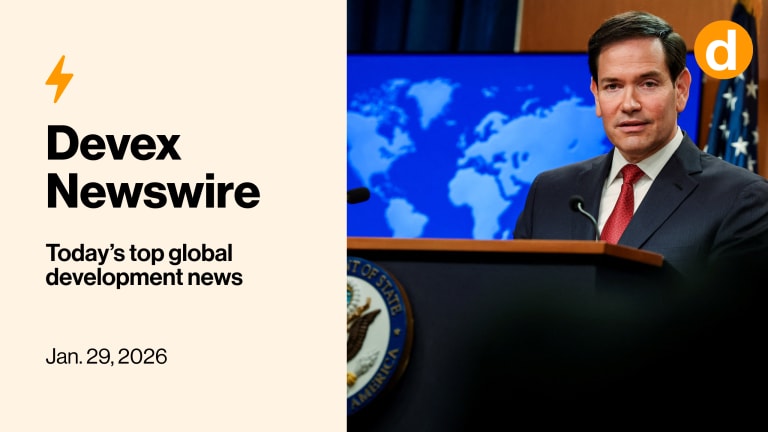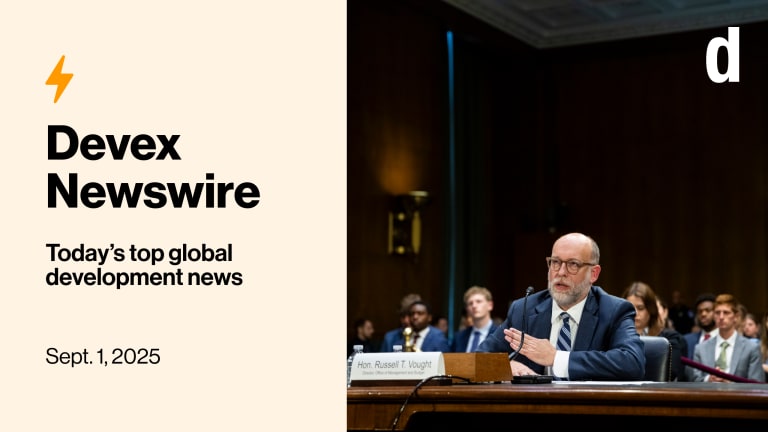
Fear and loathing prevails across global development as agencies try to untangle what’s going on and what it means for them. With funding in limbo, navigating the U.S. foreign aid freeze is critical for survival. We provide answers to the thorniest questions.
Also in today’s edition: We continue to bring you the fallout from U.S. President Donald Trump’s new normal.
+ See you soon at 9 a.m. ET (3 p.m. CET) today for an ask-me-anything discussion on how to find your next development gig. Can’t attend live? Register anyway, and we’ll send you a recording.
Deep freeze
This is a preview of Newswire
Sign up to this newsletter for an inside look at the biggest stories in global development, in your inbox daily.
As the fallout to Trump’s executive orders continues to reverberate through global development, we bring you more about what it means and how you can prepare. The foreign aid freeze has triggered work stoppages, layoffs, and funding uncertainty, leaving aid implementers scrambling. Devex Senior Reporter Adva Saldinger explains what you need to know:
1️⃣ All programs under review — a 90-day review will determine which aid programs continue, change, or get cut. Decisions could take months.
2️⃣ USAID sidelined — instead of USAID, Trump officials are leading the process, raising concerns that the review is a cover for deep funding cuts.
3️⃣ Waivers are a mess — some humanitarian aid and security-related programs have secured waivers, but the process is opaque and inconsistent.
4️⃣ Contracts vs. grants — contractors may have legal options if funding is cut, but grantees are more vulnerable, as the government can cancel grants with little recourse.
5️⃣ Prepare for uncertainty — aid groups must comply with stop orders, document expenses, and plan for potential legal battles over withheld payments.
With funding at risk and priorities shifting, organizations must act fast to protect resources and navigate the freeze.
Read: 5 key questions about the US foreign aid halt, funding freeze (Pro)
+ Join us for our next Devex Pro briefing on Monday, Feb. 3, to get the latest insights on the U.S. aid crisis including the legal and financial impact on USAID partners and their staff. Save your spot now.
This event is part of a series to navigate the uncertainties of the U.S. aid freeze under the Trump administration, exclusively for Devex Pro members. Not yet gone Pro? Start your 15-day free trial now to access all our exclusive offerings!
Wishful thinking?
After the U.S. State Department issued a waiver for “life-saving humanitarian assistance” yesterday, some supporters of PEPFAR breathed a sigh of relief. After all, what could be more lifesaving than antiretroviral medications that keep millions of people with HIV/AIDS alive?
But word to the wise: Never assume anything with this administration.
Adva reports that there’s still a lot of confusion as to whether this latest order applies to PEPFAR, also known as the U.S. President’s Emergency Plan for AIDS Relief.
Yet that hasn’t stopped some from saying that PEPFAR is getting a reprieve. The New York Times, for example, reported that the waiver seemed to allow for PEPFAR to distribute HIV medications, which was a surprise because that hadn’t been confirmed, sources tell Adva. UNAIDS also issued a statement that the waiver would allow people to continue accessing HIV treatment through PEPFAR.
But these reports and statements have all come before any official confirmation from the State Department, according to multiple sources.
PEPFAR received roughly $6.5 billion in U.S. funding last year, so a lot of money is at stake — which may be making negotiations over any exemption that much harder given that Trump has repeatedly pushed for significant spending cuts to foreign aid.
Read: Questions swirl about whether humanitarian aid waiver applies to PEPFAR
ICYMI: State Department approves waiver for lifesaving humanitarian aid
+ For more insider reporting on PEPFAR and other trending global health topics, sign up for Devex CheckUp, a free, weekly newsletter — and get the latest edition in your inbox today!
The peacemaker
“Look, I will get along very well with President Trump. We will get along very well with him. I’m not concerned about that,” African Development Bank President Akinwumi Adesina told my colleague Ayenat Mersie on the sidelines of the African Energy Summit in Dar es Salaam, Tanzania.
“I think that he is doing what’s in the interest of America. We are doing what is in the interest of Africa, and we are doing a great job of that. So I have no issues. We get along very, very well in terms of how we are going to work together, because we’ve been doing that for a long time,” he said.
The United States is AfDB’s second-largest shareholder. But Adesina and the Trump administration don’t always see eye to eye. During Trump’s first term, the U.S. accused Adesina of favoritism. He dismissed the allegations as “trumped up.” The bank’s internal review cleared him, but then-U.S. Treasury Secretary Steven Mnuchin rejected the findings.
Now, the status of some projects between the two partners is uncertain. Just four months ago, AfDB and USAID signed a $600 million regional development agreement for the Sahel, focused on governance, agriculture, and private sector growth. But with a White House executive order pausing foreign aid, the future of the initiative is unclear.
“In the case of the project, I think right now we will have to wait because of the executive order … But I have no doubt that these are strategic projects in terms of regional integration, infrastructure, international inclusion, and corridors,” Adesina said, emphasizing that these efforts are key to creating jobs in some of the most fragile parts of Africa.
Ir-ration-al decisions
What does all this Trump chaos mean for global food aid? His executive order has halted nearly all U.S. foreign assistance, with exemptions for “emergency food aid” — but no clear definition of what qualifies. Critical programs such as USAID’s $1 billion Feed the Future initiative have ground to a halt, while aid groups are being blindsided by stop-work emails and looming layoffs.
In Mozambique, $3.5 million in already procured food for nearly 100,000 people risks rotting in storage, while 70,000 Ethiopians could lose access to clean water. Aid experts warn the freeze will have irreversible consequences, derailing food supply chains, disrupting planting seasons, and undermining America’s decades-long leadership in global food security.
Without clarity or a plan, this isn’t just a review — it’s a bureaucratic disaster with life-or-death stakes, writes Devex Senior Editor Tania Karas.
Read: How Trump’s US aid stop-work order affects global food aid
+ For more content like this, sign up to Devex Dish, a weekly newsletter on the transformation of the global food system.
Not the end of the world
Condemnation for Trump’s withdrawal from the Paris climate agreement has been fast and furious, especially in Europe, but one top European Union official says it may not be such a bad thing.
Jozef Síkela, the EU’s development chief, attacked Trump’s move to yank the United States out of the Paris accord but argued it will be “good” for European companies that can plug the investment gap left behind, reports my colleague Rob Merrick.
Giving evidence to members of the European Parliament in Brussels, Síkela called the Paris accord — signed by almost every nation in a bid to limit global warming to 1.5 degrees Celsius — “the best hope of all humanity,” predicting: “The U.S., sooner or later, will be forced to turn back. I think that certain things are unavoidable.”
However, the holder of the European Commission’s International Partnerships brief also told members of the Development Committee: “If you want to hear my very private, humble, view — good for us.”
But it wasn’t all sunshine and rainbows. Síkela was clear-eyed that Trump’s 90-day freeze on U.S. foreign aid may not end well for partners: “We have to expect that they will come back with a substantially reduced amount — or not at all.”
Read: US Paris pullout ‘good’ for European firms, says EU development chief
Did we miss anything? Is your organization affected by the 90-day aid freeze? We’re collecting stories on what it means for the aid community and would love to hear from you. Drop us a line at editor@devex.com.
You can also keep up with the impact on development work with our tracker.
In other news
Aid experts dispute Trump's unsubstantiated claim that the U.S. spent $50 million on condoms for Gaza, which he had portrayed as an example of wasteful spending of taxpayer money. [France 24]
AfDB is preparing to launch a regional refinancing facility that will help African nations refinance their debt on global markets. [Reuters]
The junta-led nations of Niger, Mali, and Burkina Faso have officially left the West African regional bloc ECOWAS, though the organization says it will keep its doors open. [AP]
Sign up to Newswire for an inside look at the biggest stories in global development.








